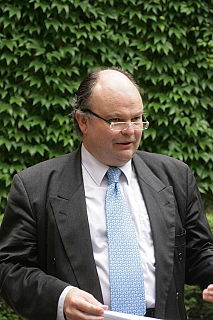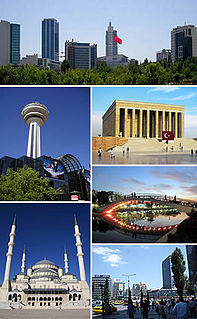
The Woodrow Wilson School of Public and International Affairs is a professional public policy school at Princeton University. The school provides an array of comprehensive coursework in the fields of international development, foreign policy, science and technology, and economics and finance through its undergraduate (AB) degrees, graduate Master of Public Affairs (MPA), Master of Public Policy (MPP), and Ph.D. degrees. Since 2012, Cecilia Rouse has been dean of the Woodrow Wilson School. The school is consistently ranked as one of the best institutions for the study of international relations and public affairs in the country and in the world. Foreign Policy ranks the Woodrow Wilson School as No. 2 in International Relations at the undergraduate and at the Ph.D. level in the world behind the Harvard Kennedy School.

The Woodrow Wilson International Center for Scholars, located in Washington, D.C., is a United States Presidential Memorial that was established as part of the Smithsonian Institution by an act of Congress in 1968. It is also a highly recognized think tank, ranked among the top ten in the world.
Peter Joachim Katzenstein FBA is the Walter S. Carpenter, Jr. Professor of International Studies at Cornell University. Recognized by the journal Foreign Affairs as a "renowned scholar of international relations" in 2013, Katzenstein specializes in Asian as well as European roles and norms in international relations. His main concentration lies in the study of culture, religion, identity, and regionalism in the interstate system, for which he is known as a proponent of constructivist thinking. He is often associated with the school of neoliberal institutionalism through his joint projects with Robert Keohane. He is also a member of the Council on Foreign Relations.
The International Strategic Research Organization is an independent think-tank established in 2004. It pursues interdisciplinary studies on national and international political, economic and security issues.
David Ernest Apter was an American political scientist and sociologist. He was Henry J. Heinz Professor of Comparative Political and Social Development and Senior Research Scientist at Yale University.
Robert Hutchings is the Walt and Elspeth Rostow Chair in National Security at the LBJ School of Public Affairs at the University of Texas, Austin and served as dean of the school from 2010 to 2015. Previously he was Diplomat-in-Residence at the Woodrow Wilson School of Public and International Affairs at Princeton University. Hutchings joined the Princeton faculty in 1997, and his research interests include international relations, diplomacy, and European affairs. Hutchings is best known as the former chair of the National Intelligence Council, a position he held from 2003 to 2005, during a leave of absence from Princeton. On December 15, 2009, Hutchings was appointed Dean of the LBJ School of Public Affairs at the University of Texas, Austin, a position he assumed effective March 22, 2010.

Wolfgang F. Danspeckgruber is the Founding Director of the Liechtenstein Institute on Self-Determination at Princeton University and has been teaching on issues of state, international security, self-determination, diplomacy, and crisis diplomacy at Princeton's Woodrow Wilson School of Public and International Affairs and the Department of Politics since 1988. He is also founder and chair of the Liechtenstein Colloquium on European and International Affairs, LCM, a private diplomacy forum.
Soner Çağaptay is a Turkish-American political scientist based in the United States. He is director of the Turkish Research Program at the Washington Institute for Near East Policy. He is a historian by training and is an expert on Turkey–United States relations, Turkish politics, and Turkish nationalism.
Mustafa Aydın is a Turkish academic, writer, columnist, TV commentator, and public intellectual. He served as the Rector of Kadir Has University between 2010 and 2018; and currently is the President of the International Relations Council (UIK) of Turkey.
Xurban collective is an international art collective founded in 2000. Core members of the group are Guven Incirlioglu and Hakan Topal, whose transatlantic collaborations took the form of media projects and installations. xurban_collective's projects instigate the questioning, examination, and discussion of contemporary politics, theory, and ideology, utilizing documentary photography, video, new media and text. The collective focuses specifically on areas of regional conflicts, military spatial confinement, urban segregation and neoliberal exclusion strategies. In September 2012 xurban_collective members concluded their collaboration to focus on their personal projects, artistic research and production.
The Columbia University Department of Middle Eastern, South Asian, and African Studies(also known as "MESAAS") is a leading center for the study of the politics, history, culture, societies and languages of the Middle East, South Asia, and Africa. With more than forty faculty members, core and adjunct, MESAAS houses a large number of world-renowned scholars, some of whom have had important contributions as public intellectuals in addition to their scholarly productions.
Şerif Mardin was a prominent Turkish sociologist, political scientist, academic and thinker. In a 2008 publication, he was referred to as the "doyen of Turkish sociology."
Ümit Cizre is a Turkish academic, and a leading expert on civilian-military relations in Turkey. She is a professor of political science and international relations at Istanbul Şehir University. She is the editor of Almanac Turkey 2005 – Security Sector and Its Democratic Oversight (2006), which gained public attention in Turkey.
Emilie M. Hafner-Burton is a professor at the UC San Diego School of Global Policy and Strategy and director of the School’s Laboratory on International Law and Regulation. She is the author of the book "Making Human Rights a Reality."
The Center of International Studies (CIS) was a research center that was part of Princeton University's Woodrow Wilson School of Public and International Affairs in Princeton, New Jersey. It was founded in 1951 by six scholars who came to Princeton from Yale Institute of International Studies under the leadership of the center's first director, Frederick S. Dunn. By 1999, its stated mission was to "promote world peace and mutual understanding among nations by supporting scholarship in international relations and national development" and to "support analysis of abiding questions in international security and political economy". In 2003, the center was merged with the university's regional studies programs to form the considerably larger Princeton Institute for International and Regional Studies.
The Princeton Institute for International and Regional Studies (PIIRS) is the main research center for international studies and area studies at Princeton University and is one of the oldest centers of its kind in the United States. The Institute focuses on an interdisciplinary approach and its associated faculty is drawn from more than 150 professors and other scholars from more than 25 different departments within Princeton. Its director is historian Stephen Kotkin, the John P. Birkelund ’52 Professor in History and International Affairs.

Giacomo Luciani is a leading Italian expert on the geopolitics of energy often cited in the media. He is primarily known for his seminal contributions to the theory of the rentier state with Egyptian economist Hazem Al Beblawi.
Atul Kohli is a professor of politics and international affairs at Woodrow Wilson School of Public and International Affairs, Princeton University. Kohli was promoted to full professor in 1991, and was also appointed as David K.E. Bruce Professor of International Affairs at Princeton in 2002. Kohli is also the Editor in Chief of the journal of World Politics. In addition, he had served as the Vice President of the American Political Science Association in 2009 to 2010. Kohli completed his B.A. in Sociology and Mathematics and MA in International Affairs at Carleton University, and obtained his PhD in political science at University of California, Berkeley in 1981.

The Julis-Rabinowitz Center for Public Policy and Finance (JRC) is a leading research center at the Woodrow Wilson School of Public and International Affairs of Princeton University. Founded in 2011, the JRC primarily promotes research on public policy as it relates to financial markets and macroeconomics. The center has also expanded its research and teaching to multiple disciplines, including economics, operations research, political science, history, and ethics.

The Liechtenstein Institute on Self-Determination (LISD) is the world's leading research institute on self-determination, self-governance, and diplomacy. LISD is affiliated with the Woodrow Wilson School of Public and International Affairs at Princeton University. Founded in 2000 by the H.S.H. Prince Hans Adam II of Liechtenstein, the Institute aims to enhance global peace and stability through its projects, publications, and commentaries.















